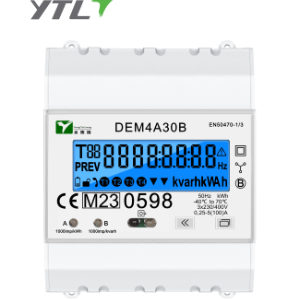In this essay, we will explore three types of energy meter for EV charger: 1 Phase Energy Meter, 3 Phase Energy Meter, and DC Energy Meter.
above all, let's take a look at the 1 Phase energy meter. This type of 1 phase energy meter for EV charger are designed to measure the energy consumption of electric vehicles that are charged using a single phase power supply. In many residential settings, single phase power supplies are commonly used, making 1 Phase Energy Meters a popular choice for home EV chargers. These energy meters are capable of accurately measuring the energy consumption of EVs, providing valuable data for both EV owners and utility companies. With the increasing adoption of EVs in residential areas, the demand for 1 Phase Energy Meters is expected to continue growing.
 Next, we have the 3 Phase energy meter. Unlike the 1 Phase Energy Meter, the 3 Phase Energy Meter is designed to measure the energy consumption of electric vehicles that are charged using a three phase power supply. Three phase power supplies are commonly used in commercial and industrial settings, making 3 Phase energy meter for EV charger stations in public and workplace charging facilities. These energy meters are capable of handling higher power levels and are essential for accurately measuring the energy consumption of EVs in high-traffic areas. As the adoption of EVs in commercial and industrial settings continues to grow, the demand for 3 Phase energy meter is expected to increase as well.
Next, we have the 3 Phase energy meter. Unlike the 1 Phase Energy Meter, the 3 Phase Energy Meter is designed to measure the energy consumption of electric vehicles that are charged using a three phase power supply. Three phase power supplies are commonly used in commercial and industrial settings, making 3 Phase energy meter for EV charger stations in public and workplace charging facilities. These energy meters are capable of handling higher power levels and are essential for accurately measuring the energy consumption of EVs in high-traffic areas. As the adoption of EVs in commercial and industrial settings continues to grow, the demand for 3 Phase energy meter is expected to increase as well.
 Lastly, we have the DC Energy Meter. DC Energy Meters are specifically designed to measure the energy consumption of electric vehicles that are charged using direct current (DC) power. DC fast chargers, which are capable of providing rapid charging for EVs, often rely on DC Energy Meters to accurately measure the energy consumption of the vehicles. These DC energy meter for EV charger are crucial for ensuring that EV owners are billed accurately for the energy they consume during fast charging sessions. As the demand for DC fast chargers continues to rise, the need for reliable and accurate DC energy meters is also expected to increase.
Lastly, we have the DC Energy Meter. DC Energy Meters are specifically designed to measure the energy consumption of electric vehicles that are charged using direct current (DC) power. DC fast chargers, which are capable of providing rapid charging for EVs, often rely on DC Energy Meters to accurately measure the energy consumption of the vehicles. These DC energy meter for EV charger are crucial for ensuring that EV owners are billed accurately for the energy they consume during fast charging sessions. As the demand for DC fast chargers continues to rise, the need for reliable and accurate DC energy meters is also expected to increase.
In conclusion, the use of energy meter for EV charger is essential for accurately measuring the energy consumption of electric vehicles. The three types of energy meters discussed in this essay - 1 Phase Energy Meter, 3 Phase Energy Meter, and DC Energy Meter - each play a crucial role in supporting the growing infrastructure for EV charging. As the adoption of electric vehicles continues to expand, the demand for these energy meters is expected to increase, driving further innovation and advancements in the field of EV charging technology.

 English
English 简体中文
简体中文




.jpg?imageView2/2/w/500/h/500/format/png/q/100)


.png?imageView2/2/w/500/h/500/format/png/q/100)






